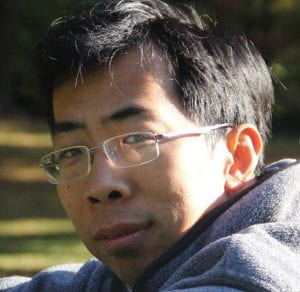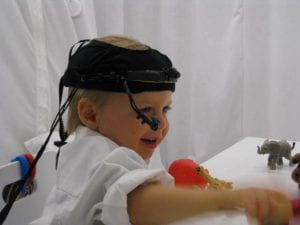“…the exciting part is how we can go beyond the laboratory to study phenomena in the real world because ultimately, we want our findings to have impact in the real world.”
 An interview with Chen Yu, PhD
An interview with Chen Yu, PhD
Professor Cognitive Science
Professor Psychological and Brain Sciences
Indiana University, Bloomington
By Michelle Johnson (10/18/19)
Did you always know you would end up doing scientific research?
I started in electrical engineering in college, and then I went to graduate school and started computer science, but now I’m a professor in psychology. I was interested in playing with electronic devices, and then I got interested in artificial intelligence, AI, in graduate school. I really feel all my background is certainly relevant for what I’m doing. I see myself as using my computer science knowledge, using my engineering skills and approach to studying science, and I think it is very intellectually exciting to explore connections from engineering to science back and forth. But it’s certainly not the case that I knew what I was going to be, that I was going into psychology.
What are some questions you’re most excited about now?
I study language learning [in children] because we know children are amazing language learners. They learn a lot in the first couple of years, and if we make comparisons [between children and] state-of-the-art computer programs, machine learning—but children are still more efficient learners because they require fewer data to achieve similar performances compared to machine learners.
What I’m interested in is how they are that good at learning language, and I’m doing work to connect computer science and cognitive science. In computer science, there are all these new technologies available; in my lab we use eye-tracking, motion-tracking, and we bring equipment and tools to the children’s home, collect data there, and use data mining techniques to analyze the data. I feel the exciting part is how we can go beyond the laboratory to study phenomena in the real world because ultimately, we want our findings to have impact in the real world.
What do you hope that impact would be?
In my lab we bring the equipment to a child’s home to study how they learn language in a social context, for instance, how they interact with their parents. I use head-mounted eye tracking, and we can measure things like [where children attend] when they interact with [their parents] in toy play and…when they’re provided [an object’s] label by the parents. We found that there a re huge individual differences: some parents are really good at finding the right moment to provide linguistic information for the children while then some other parents are multitasking. We have an eye tracking device that measures exactly where the learner looks when they hear linguistic information, and there are some moments when parents may label an object a “cat, cat, cat, cat” but from the eye tracker we can see the child is looking at the ceiling or outside the window, and that’s not good information. So, we have findings that provide general principles for parents to provide better language learning education and environments.
re huge individual differences: some parents are really good at finding the right moment to provide linguistic information for the children while then some other parents are multitasking. We have an eye tracking device that measures exactly where the learner looks when they hear linguistic information, and there are some moments when parents may label an object a “cat, cat, cat, cat” but from the eye tracker we can see the child is looking at the ceiling or outside the window, and that’s not good information. So, we have findings that provide general principles for parents to provide better language learning education and environments.
What’s the best piece of advice you’ve ever received?
While I was a graduate student at Rochester, my PhD advisor, Dana Ballard, gave me advice to always take a longer view. When we do research after graduate training, we already become experts in some area, and there are always opportunities to do incremental work and publish papers—that’s our job, so to speak. But sometimes I think it’s really important to zoom out and think about the big picture, what am I going to do, not in next month, but in the next few years. I like to think about high risk, high pay-off projects.
To learn more about Dr. Yu and his research, visit his lab website here
Click here to go back to the “Interviews with Scientists” page.
